Reflective Portfolio: Academic Writing, Learning Theories, and Skills
VerifiedAdded on 2020/11/12
|18
|6362
|65
Report
AI Summary
This reflective portfolio presents an academic analysis of learning theories and their application to a practical experience. The report begins with an executive summary and an introduction to the concept of reflective portfolios, which serve to assess a student's academic work, progress, and ability to apply theoretical knowledge. The main body of the report delves into three core learning theories: social learning theory, experiential learning theory, and self-directed learning theory, providing detailed explanations and examples of each. It includes a personal reflective report based on a Hackathon event focused on the UK housing crisis, where the student reflects on their learning and experience. The portfolio concludes with a personal development plan aimed at improving the student's skills. The analysis covers the student’s application of the theories, their observation skills, and their ability to learn from experiences, as well as a Gibbs reflection cycle to analyze the experience. The report also highlights the importance of continuous learning for professional success.
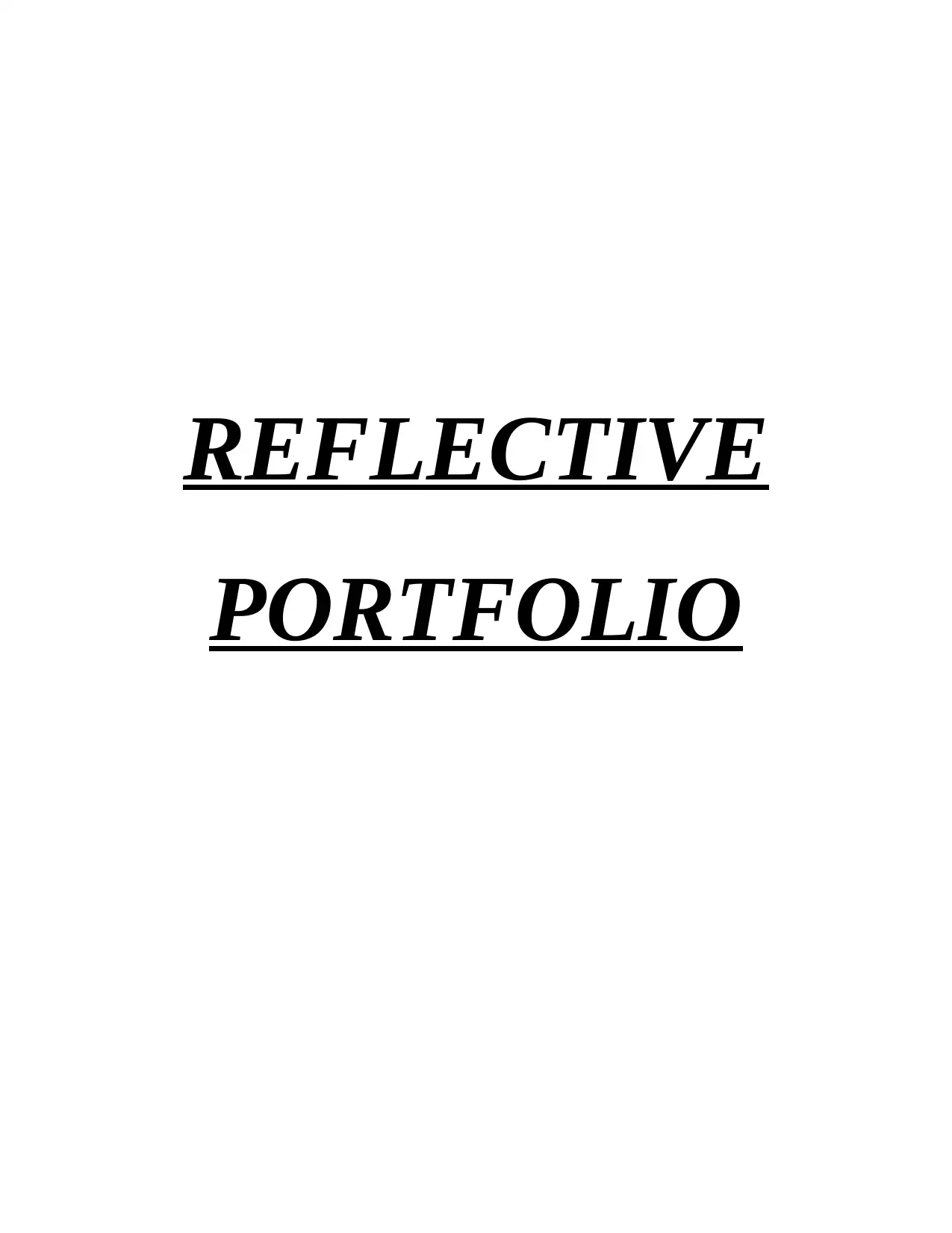
REFLECTIVE
PORTFOLIO
PORTFOLIO
Paraphrase This Document
Need a fresh take? Get an instant paraphrase of this document with our AI Paraphraser
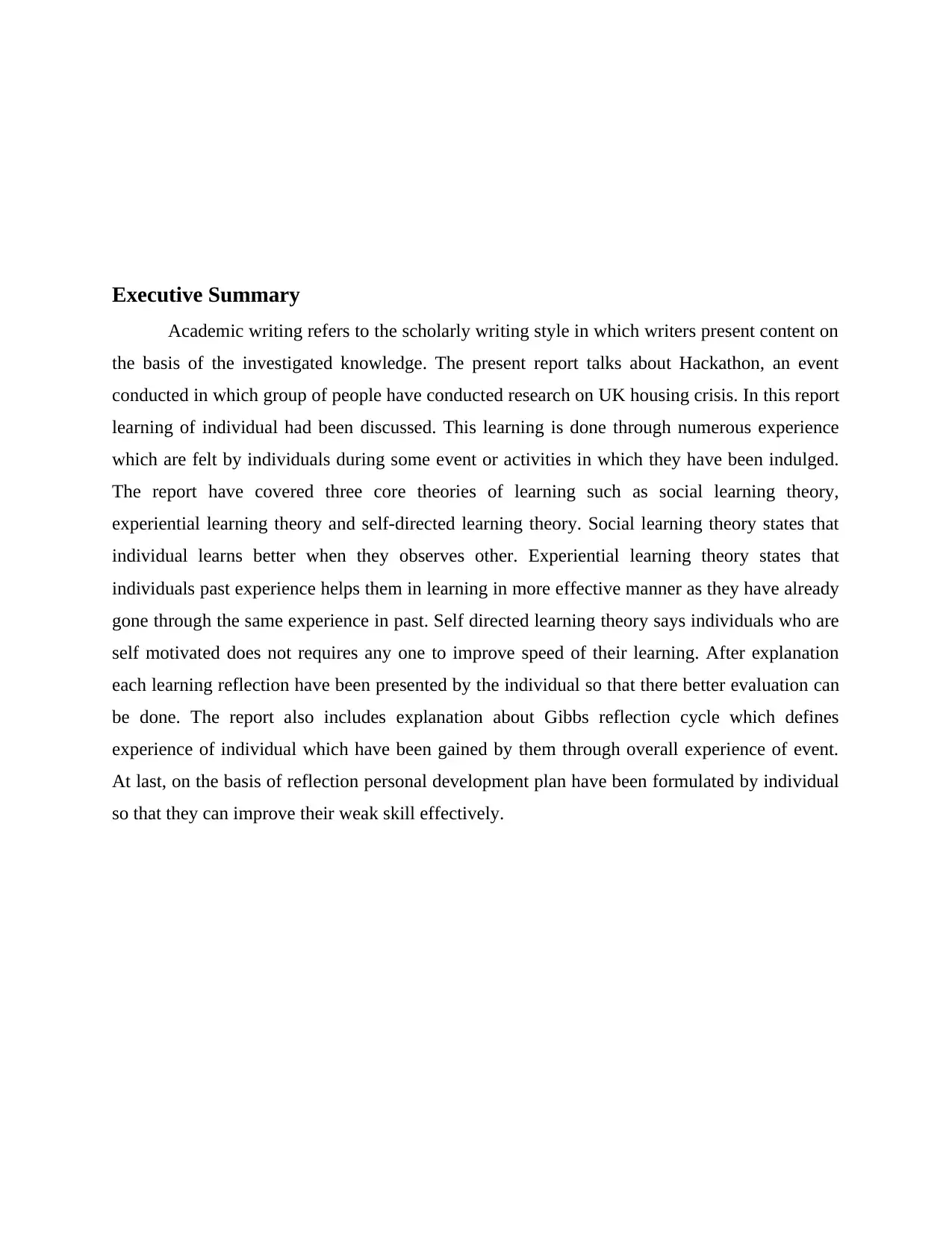
Executive Summary
Academic writing refers to the scholarly writing style in which writers present content on
the basis of the investigated knowledge. The present report talks about Hackathon, an event
conducted in which group of people have conducted research on UK housing crisis. In this report
learning of individual had been discussed. This learning is done through numerous experience
which are felt by individuals during some event or activities in which they have been indulged.
The report have covered three core theories of learning such as social learning theory,
experiential learning theory and self-directed learning theory. Social learning theory states that
individual learns better when they observes other. Experiential learning theory states that
individuals past experience helps them in learning in more effective manner as they have already
gone through the same experience in past. Self directed learning theory says individuals who are
self motivated does not requires any one to improve speed of their learning. After explanation
each learning reflection have been presented by the individual so that there better evaluation can
be done. The report also includes explanation about Gibbs reflection cycle which defines
experience of individual which have been gained by them through overall experience of event.
At last, on the basis of reflection personal development plan have been formulated by individual
so that they can improve their weak skill effectively.
Academic writing refers to the scholarly writing style in which writers present content on
the basis of the investigated knowledge. The present report talks about Hackathon, an event
conducted in which group of people have conducted research on UK housing crisis. In this report
learning of individual had been discussed. This learning is done through numerous experience
which are felt by individuals during some event or activities in which they have been indulged.
The report have covered three core theories of learning such as social learning theory,
experiential learning theory and self-directed learning theory. Social learning theory states that
individual learns better when they observes other. Experiential learning theory states that
individuals past experience helps them in learning in more effective manner as they have already
gone through the same experience in past. Self directed learning theory says individuals who are
self motivated does not requires any one to improve speed of their learning. After explanation
each learning reflection have been presented by the individual so that there better evaluation can
be done. The report also includes explanation about Gibbs reflection cycle which defines
experience of individual which have been gained by them through overall experience of event.
At last, on the basis of reflection personal development plan have been formulated by individual
so that they can improve their weak skill effectively.
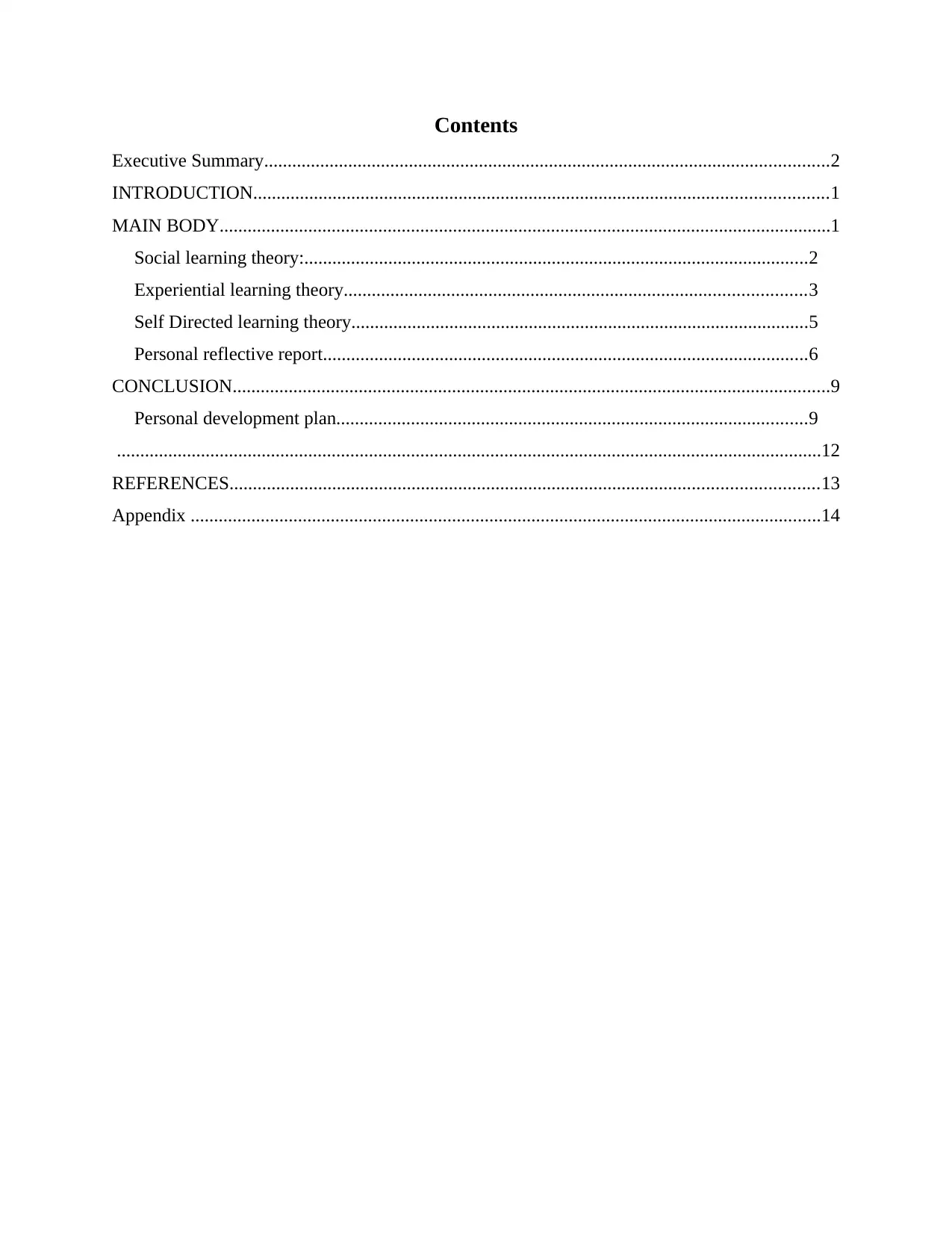
Contents
Executive Summary.........................................................................................................................2
INTRODUCTION...........................................................................................................................1
MAIN BODY...................................................................................................................................1
Social learning theory:............................................................................................................2
Experiential learning theory...................................................................................................3
Self Directed learning theory..................................................................................................5
Personal reflective report........................................................................................................6
CONCLUSION................................................................................................................................9
Personal development plan.....................................................................................................9
.......................................................................................................................................................12
REFERENCES..............................................................................................................................13
Appendix .......................................................................................................................................14
Executive Summary.........................................................................................................................2
INTRODUCTION...........................................................................................................................1
MAIN BODY...................................................................................................................................1
Social learning theory:............................................................................................................2
Experiential learning theory...................................................................................................3
Self Directed learning theory..................................................................................................5
Personal reflective report........................................................................................................6
CONCLUSION................................................................................................................................9
Personal development plan.....................................................................................................9
.......................................................................................................................................................12
REFERENCES..............................................................................................................................13
Appendix .......................................................................................................................................14
⊘ This is a preview!⊘
Do you want full access?
Subscribe today to unlock all pages.

Trusted by 1+ million students worldwide

Paraphrase This Document
Need a fresh take? Get an instant paraphrase of this document with our AI Paraphraser
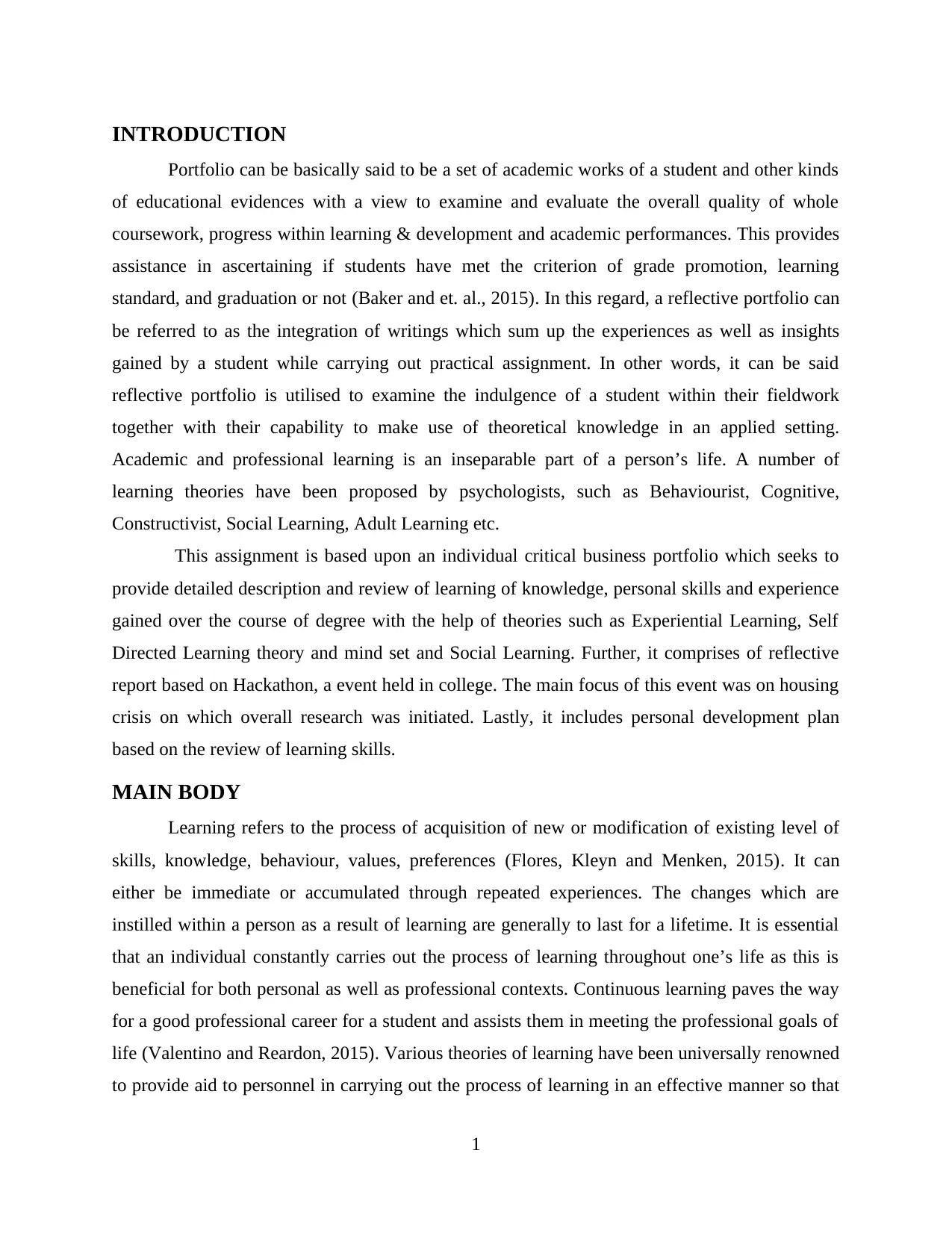
INTRODUCTION
Portfolio can be basically said to be a set of academic works of a student and other kinds
of educational evidences with a view to examine and evaluate the overall quality of whole
coursework, progress within learning & development and academic performances. This provides
assistance in ascertaining if students have met the criterion of grade promotion, learning
standard, and graduation or not (Baker and et. al., 2015). In this regard, a reflective portfolio can
be referred to as the integration of writings which sum up the experiences as well as insights
gained by a student while carrying out practical assignment. In other words, it can be said
reflective portfolio is utilised to examine the indulgence of a student within their fieldwork
together with their capability to make use of theoretical knowledge in an applied setting.
Academic and professional learning is an inseparable part of a person’s life. A number of
learning theories have been proposed by psychologists, such as Behaviourist, Cognitive,
Constructivist, Social Learning, Adult Learning etc.
This assignment is based upon an individual critical business portfolio which seeks to
provide detailed description and review of learning of knowledge, personal skills and experience
gained over the course of degree with the help of theories such as Experiential Learning, Self
Directed Learning theory and mind set and Social Learning. Further, it comprises of reflective
report based on Hackathon, a event held in college. The main focus of this event was on housing
crisis on which overall research was initiated. Lastly, it includes personal development plan
based on the review of learning skills.
MAIN BODY
Learning refers to the process of acquisition of new or modification of existing level of
skills, knowledge, behaviour, values, preferences (Flores, Kleyn and Menken, 2015). It can
either be immediate or accumulated through repeated experiences. The changes which are
instilled within a person as a result of learning are generally to last for a lifetime. It is essential
that an individual constantly carries out the process of learning throughout one’s life as this is
beneficial for both personal as well as professional contexts. Continuous learning paves the way
for a good professional career for a student and assists them in meeting the professional goals of
life (Valentino and Reardon, 2015). Various theories of learning have been universally renowned
to provide aid to personnel in carrying out the process of learning in an effective manner so that
1
Portfolio can be basically said to be a set of academic works of a student and other kinds
of educational evidences with a view to examine and evaluate the overall quality of whole
coursework, progress within learning & development and academic performances. This provides
assistance in ascertaining if students have met the criterion of grade promotion, learning
standard, and graduation or not (Baker and et. al., 2015). In this regard, a reflective portfolio can
be referred to as the integration of writings which sum up the experiences as well as insights
gained by a student while carrying out practical assignment. In other words, it can be said
reflective portfolio is utilised to examine the indulgence of a student within their fieldwork
together with their capability to make use of theoretical knowledge in an applied setting.
Academic and professional learning is an inseparable part of a person’s life. A number of
learning theories have been proposed by psychologists, such as Behaviourist, Cognitive,
Constructivist, Social Learning, Adult Learning etc.
This assignment is based upon an individual critical business portfolio which seeks to
provide detailed description and review of learning of knowledge, personal skills and experience
gained over the course of degree with the help of theories such as Experiential Learning, Self
Directed Learning theory and mind set and Social Learning. Further, it comprises of reflective
report based on Hackathon, a event held in college. The main focus of this event was on housing
crisis on which overall research was initiated. Lastly, it includes personal development plan
based on the review of learning skills.
MAIN BODY
Learning refers to the process of acquisition of new or modification of existing level of
skills, knowledge, behaviour, values, preferences (Flores, Kleyn and Menken, 2015). It can
either be immediate or accumulated through repeated experiences. The changes which are
instilled within a person as a result of learning are generally to last for a lifetime. It is essential
that an individual constantly carries out the process of learning throughout one’s life as this is
beneficial for both personal as well as professional contexts. Continuous learning paves the way
for a good professional career for a student and assists them in meeting the professional goals of
life (Valentino and Reardon, 2015). Various theories of learning have been universally renowned
to provide aid to personnel in carrying out the process of learning in an effective manner so that
1
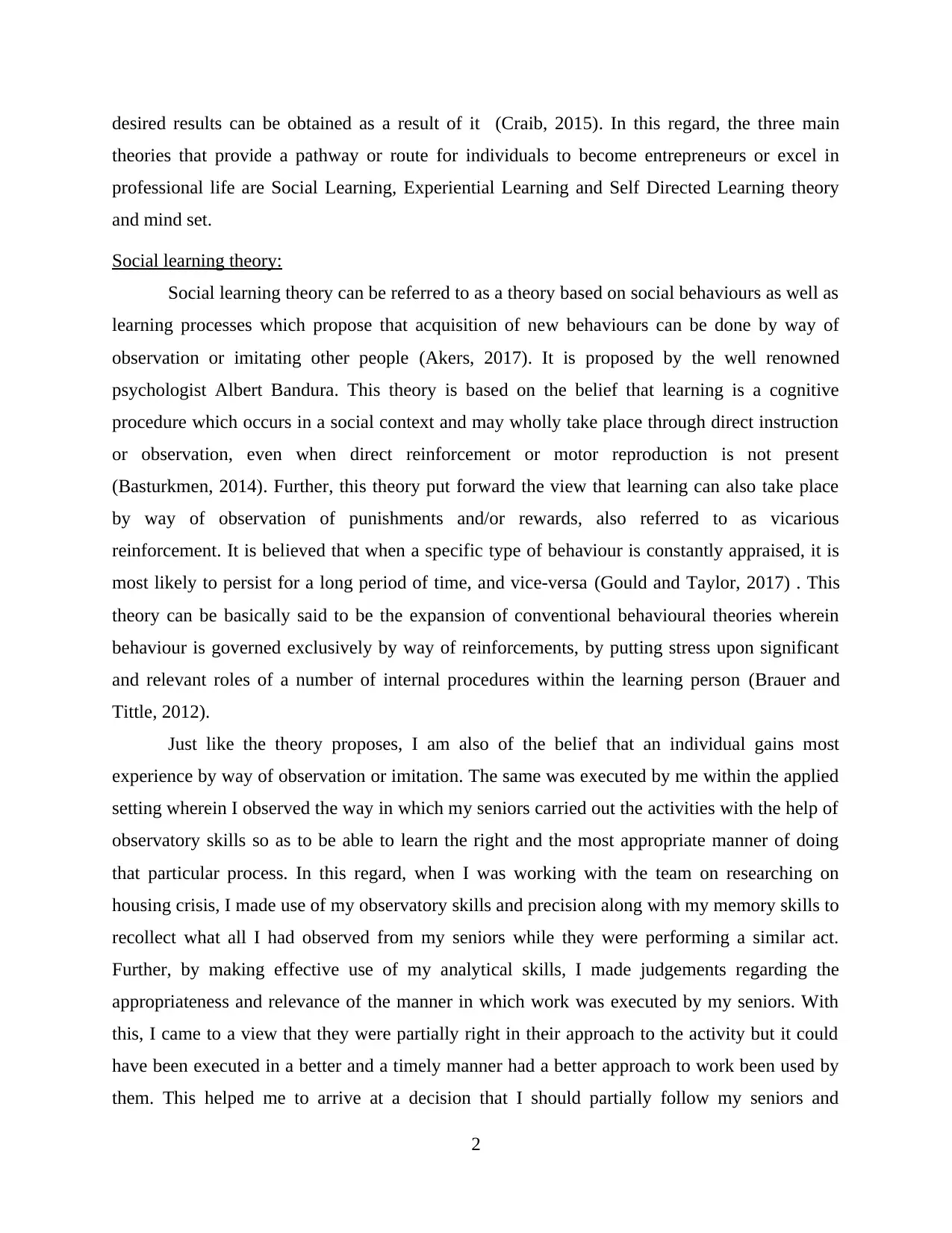
desired results can be obtained as a result of it (Craib, 2015). In this regard, the three main
theories that provide a pathway or route for individuals to become entrepreneurs or excel in
professional life are Social Learning, Experiential Learning and Self Directed Learning theory
and mind set.
Social learning theory:
Social learning theory can be referred to as a theory based on social behaviours as well as
learning processes which propose that acquisition of new behaviours can be done by way of
observation or imitating other people (Akers, 2017). It is proposed by the well renowned
psychologist Albert Bandura. This theory is based on the belief that learning is a cognitive
procedure which occurs in a social context and may wholly take place through direct instruction
or observation, even when direct reinforcement or motor reproduction is not present
(Basturkmen, 2014). Further, this theory put forward the view that learning can also take place
by way of observation of punishments and/or rewards, also referred to as vicarious
reinforcement. It is believed that when a specific type of behaviour is constantly appraised, it is
most likely to persist for a long period of time, and vice-versa (Gould and Taylor, 2017) . This
theory can be basically said to be the expansion of conventional behavioural theories wherein
behaviour is governed exclusively by way of reinforcements, by putting stress upon significant
and relevant roles of a number of internal procedures within the learning person (Brauer and
Tittle, 2012).
Just like the theory proposes, I am also of the belief that an individual gains most
experience by way of observation or imitation. The same was executed by me within the applied
setting wherein I observed the way in which my seniors carried out the activities with the help of
observatory skills so as to be able to learn the right and the most appropriate manner of doing
that particular process. In this regard, when I was working with the team on researching on
housing crisis, I made use of my observatory skills and precision along with my memory skills to
recollect what all I had observed from my seniors while they were performing a similar act.
Further, by making effective use of my analytical skills, I made judgements regarding the
appropriateness and relevance of the manner in which work was executed by my seniors. With
this, I came to a view that they were partially right in their approach to the activity but it could
have been executed in a better and a timely manner had a better approach to work been used by
them. This helped me to arrive at a decision that I should partially follow my seniors and
2
theories that provide a pathway or route for individuals to become entrepreneurs or excel in
professional life are Social Learning, Experiential Learning and Self Directed Learning theory
and mind set.
Social learning theory:
Social learning theory can be referred to as a theory based on social behaviours as well as
learning processes which propose that acquisition of new behaviours can be done by way of
observation or imitating other people (Akers, 2017). It is proposed by the well renowned
psychologist Albert Bandura. This theory is based on the belief that learning is a cognitive
procedure which occurs in a social context and may wholly take place through direct instruction
or observation, even when direct reinforcement or motor reproduction is not present
(Basturkmen, 2014). Further, this theory put forward the view that learning can also take place
by way of observation of punishments and/or rewards, also referred to as vicarious
reinforcement. It is believed that when a specific type of behaviour is constantly appraised, it is
most likely to persist for a long period of time, and vice-versa (Gould and Taylor, 2017) . This
theory can be basically said to be the expansion of conventional behavioural theories wherein
behaviour is governed exclusively by way of reinforcements, by putting stress upon significant
and relevant roles of a number of internal procedures within the learning person (Brauer and
Tittle, 2012).
Just like the theory proposes, I am also of the belief that an individual gains most
experience by way of observation or imitation. The same was executed by me within the applied
setting wherein I observed the way in which my seniors carried out the activities with the help of
observatory skills so as to be able to learn the right and the most appropriate manner of doing
that particular process. In this regard, when I was working with the team on researching on
housing crisis, I made use of my observatory skills and precision along with my memory skills to
recollect what all I had observed from my seniors while they were performing a similar act.
Further, by making effective use of my analytical skills, I made judgements regarding the
appropriateness and relevance of the manner in which work was executed by my seniors. With
this, I came to a view that they were partially right in their approach to the activity but it could
have been executed in a better and a timely manner had a better approach to work been used by
them. This helped me to arrive at a decision that I should partially follow my seniors and
2
⊘ This is a preview!⊘
Do you want full access?
Subscribe today to unlock all pages.

Trusted by 1+ million students worldwide
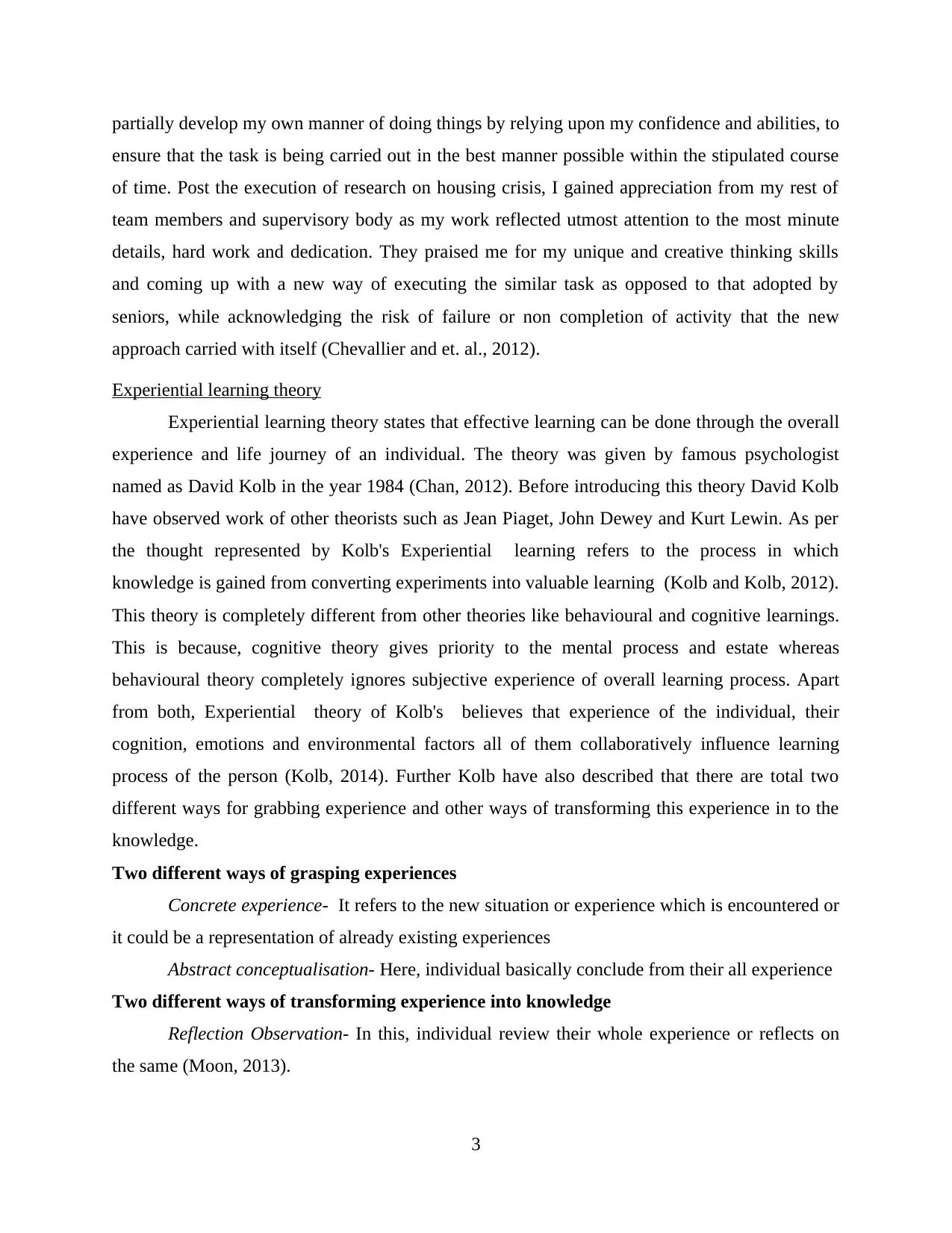
partially develop my own manner of doing things by relying upon my confidence and abilities, to
ensure that the task is being carried out in the best manner possible within the stipulated course
of time. Post the execution of research on housing crisis, I gained appreciation from my rest of
team members and supervisory body as my work reflected utmost attention to the most minute
details, hard work and dedication. They praised me for my unique and creative thinking skills
and coming up with a new way of executing the similar task as opposed to that adopted by
seniors, while acknowledging the risk of failure or non completion of activity that the new
approach carried with itself (Chevallier and et. al., 2012).
Experiential learning theory
Experiential learning theory states that effective learning can be done through the overall
experience and life journey of an individual. The theory was given by famous psychologist
named as David Kolb in the year 1984 (Chan, 2012). Before introducing this theory David Kolb
have observed work of other theorists such as Jean Piaget, John Dewey and Kurt Lewin. As per
the thought represented by Kolb's Experiential learning refers to the process in which
knowledge is gained from converting experiments into valuable learning (Kolb and Kolb, 2012).
This theory is completely different from other theories like behavioural and cognitive learnings.
This is because, cognitive theory gives priority to the mental process and estate whereas
behavioural theory completely ignores subjective experience of overall learning process. Apart
from both, Experiential theory of Kolb's believes that experience of the individual, their
cognition, emotions and environmental factors all of them collaboratively influence learning
process of the person (Kolb, 2014). Further Kolb have also described that there are total two
different ways for grabbing experience and other ways of transforming this experience in to the
knowledge.
Two different ways of grasping experiences
Concrete experience- It refers to the new situation or experience which is encountered or
it could be a representation of already existing experiences
Abstract conceptualisation- Here, individual basically conclude from their all experience
Two different ways of transforming experience into knowledge
Reflection Observation- In this, individual review their whole experience or reflects on
the same (Moon, 2013).
3
ensure that the task is being carried out in the best manner possible within the stipulated course
of time. Post the execution of research on housing crisis, I gained appreciation from my rest of
team members and supervisory body as my work reflected utmost attention to the most minute
details, hard work and dedication. They praised me for my unique and creative thinking skills
and coming up with a new way of executing the similar task as opposed to that adopted by
seniors, while acknowledging the risk of failure or non completion of activity that the new
approach carried with itself (Chevallier and et. al., 2012).
Experiential learning theory
Experiential learning theory states that effective learning can be done through the overall
experience and life journey of an individual. The theory was given by famous psychologist
named as David Kolb in the year 1984 (Chan, 2012). Before introducing this theory David Kolb
have observed work of other theorists such as Jean Piaget, John Dewey and Kurt Lewin. As per
the thought represented by Kolb's Experiential learning refers to the process in which
knowledge is gained from converting experiments into valuable learning (Kolb and Kolb, 2012).
This theory is completely different from other theories like behavioural and cognitive learnings.
This is because, cognitive theory gives priority to the mental process and estate whereas
behavioural theory completely ignores subjective experience of overall learning process. Apart
from both, Experiential theory of Kolb's believes that experience of the individual, their
cognition, emotions and environmental factors all of them collaboratively influence learning
process of the person (Kolb, 2014). Further Kolb have also described that there are total two
different ways for grabbing experience and other ways of transforming this experience in to the
knowledge.
Two different ways of grasping experiences
Concrete experience- It refers to the new situation or experience which is encountered or
it could be a representation of already existing experiences
Abstract conceptualisation- Here, individual basically conclude from their all experience
Two different ways of transforming experience into knowledge
Reflection Observation- In this, individual review their whole experience or reflects on
the same (Moon, 2013).
3
Paraphrase This Document
Need a fresh take? Get an instant paraphrase of this document with our AI Paraphraser
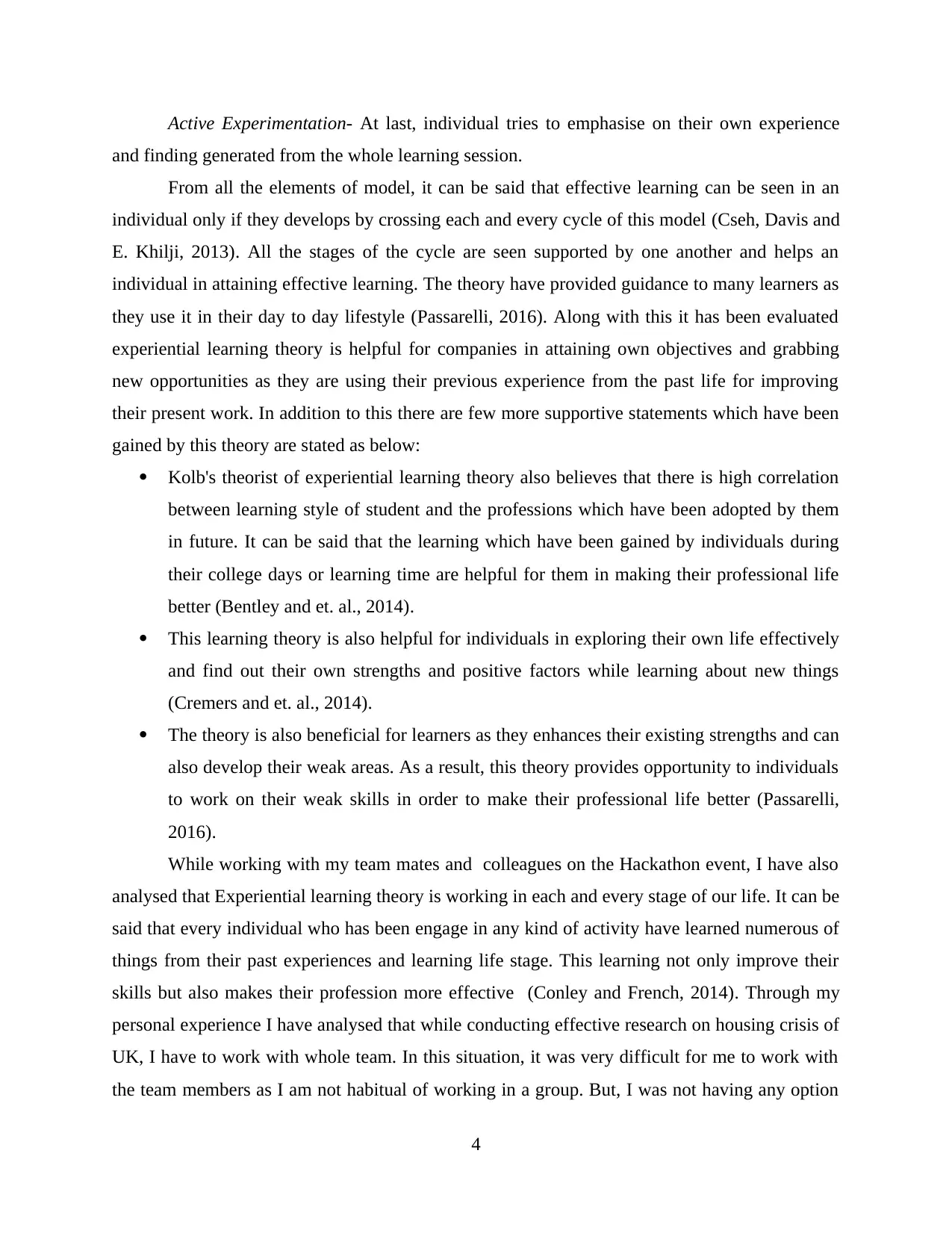
Active Experimentation- At last, individual tries to emphasise on their own experience
and finding generated from the whole learning session.
From all the elements of model, it can be said that effective learning can be seen in an
individual only if they develops by crossing each and every cycle of this model (Cseh, Davis and
E. Khilji, 2013). All the stages of the cycle are seen supported by one another and helps an
individual in attaining effective learning. The theory have provided guidance to many learners as
they use it in their day to day lifestyle (Passarelli, 2016). Along with this it has been evaluated
experiential learning theory is helpful for companies in attaining own objectives and grabbing
new opportunities as they are using their previous experience from the past life for improving
their present work. In addition to this there are few more supportive statements which have been
gained by this theory are stated as below:
Kolb's theorist of experiential learning theory also believes that there is high correlation
between learning style of student and the professions which have been adopted by them
in future. It can be said that the learning which have been gained by individuals during
their college days or learning time are helpful for them in making their professional life
better (Bentley and et. al., 2014).
This learning theory is also helpful for individuals in exploring their own life effectively
and find out their own strengths and positive factors while learning about new things
(Cremers and et. al., 2014).
The theory is also beneficial for learners as they enhances their existing strengths and can
also develop their weak areas. As a result, this theory provides opportunity to individuals
to work on their weak skills in order to make their professional life better (Passarelli,
2016).
While working with my team mates and colleagues on the Hackathon event, I have also
analysed that Experiential learning theory is working in each and every stage of our life. It can be
said that every individual who has been engage in any kind of activity have learned numerous of
things from their past experiences and learning life stage. This learning not only improve their
skills but also makes their profession more effective (Conley and French, 2014). Through my
personal experience I have analysed that while conducting effective research on housing crisis of
UK, I have to work with whole team. In this situation, it was very difficult for me to work with
the team members as I am not habitual of working in a group. But, I was not having any option
4
and finding generated from the whole learning session.
From all the elements of model, it can be said that effective learning can be seen in an
individual only if they develops by crossing each and every cycle of this model (Cseh, Davis and
E. Khilji, 2013). All the stages of the cycle are seen supported by one another and helps an
individual in attaining effective learning. The theory have provided guidance to many learners as
they use it in their day to day lifestyle (Passarelli, 2016). Along with this it has been evaluated
experiential learning theory is helpful for companies in attaining own objectives and grabbing
new opportunities as they are using their previous experience from the past life for improving
their present work. In addition to this there are few more supportive statements which have been
gained by this theory are stated as below:
Kolb's theorist of experiential learning theory also believes that there is high correlation
between learning style of student and the professions which have been adopted by them
in future. It can be said that the learning which have been gained by individuals during
their college days or learning time are helpful for them in making their professional life
better (Bentley and et. al., 2014).
This learning theory is also helpful for individuals in exploring their own life effectively
and find out their own strengths and positive factors while learning about new things
(Cremers and et. al., 2014).
The theory is also beneficial for learners as they enhances their existing strengths and can
also develop their weak areas. As a result, this theory provides opportunity to individuals
to work on their weak skills in order to make their professional life better (Passarelli,
2016).
While working with my team mates and colleagues on the Hackathon event, I have also
analysed that Experiential learning theory is working in each and every stage of our life. It can be
said that every individual who has been engage in any kind of activity have learned numerous of
things from their past experiences and learning life stage. This learning not only improve their
skills but also makes their profession more effective (Conley and French, 2014). Through my
personal experience I have analysed that while conducting effective research on housing crisis of
UK, I have to work with whole team. In this situation, it was very difficult for me to work with
the team members as I am not habitual of working in a group. But, I was not having any option
4
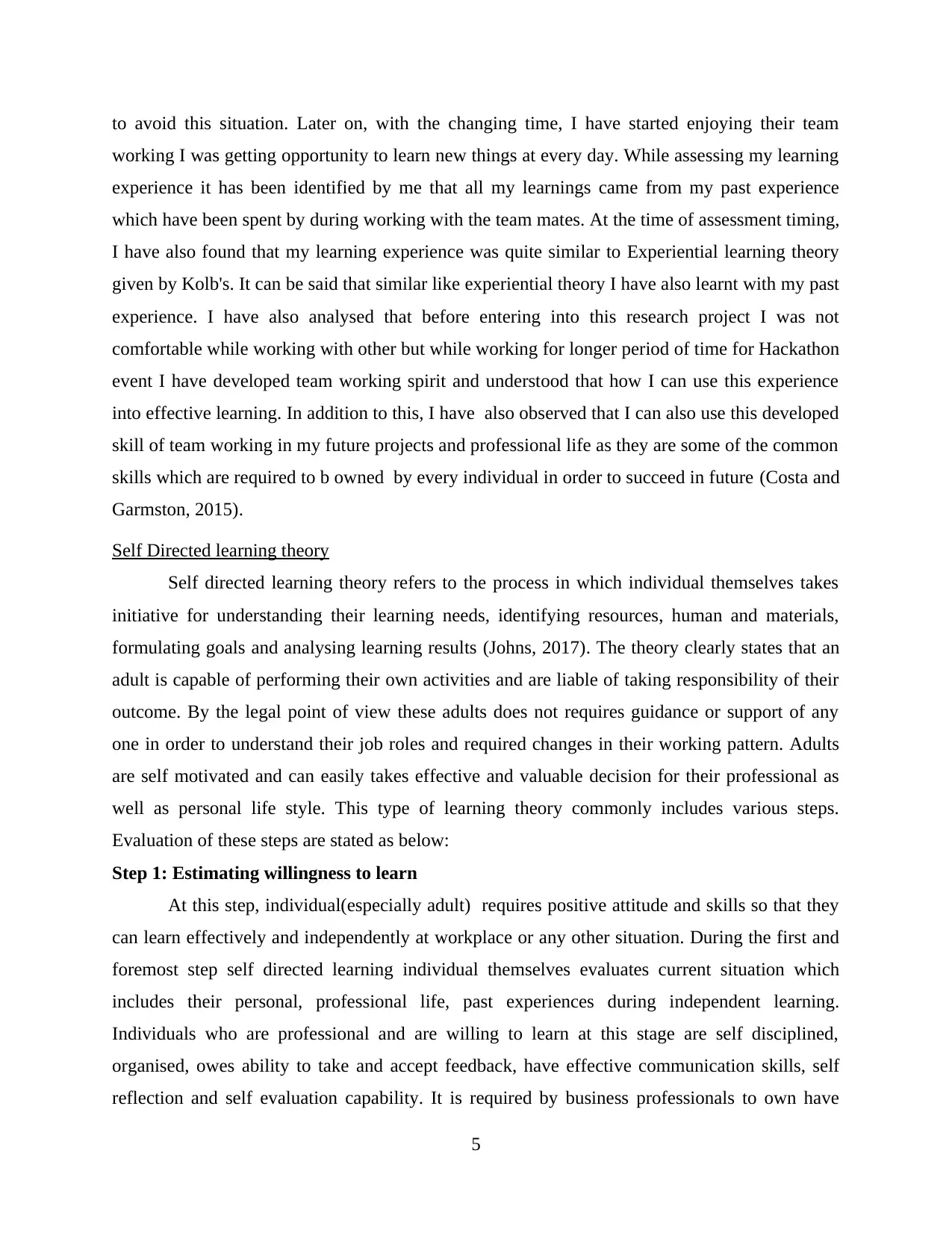
to avoid this situation. Later on, with the changing time, I have started enjoying their team
working I was getting opportunity to learn new things at every day. While assessing my learning
experience it has been identified by me that all my learnings came from my past experience
which have been spent by during working with the team mates. At the time of assessment timing,
I have also found that my learning experience was quite similar to Experiential learning theory
given by Kolb's. It can be said that similar like experiential theory I have also learnt with my past
experience. I have also analysed that before entering into this research project I was not
comfortable while working with other but while working for longer period of time for Hackathon
event I have developed team working spirit and understood that how I can use this experience
into effective learning. In addition to this, I have also observed that I can also use this developed
skill of team working in my future projects and professional life as they are some of the common
skills which are required to b owned by every individual in order to succeed in future (Costa and
Garmston, 2015).
Self Directed learning theory
Self directed learning theory refers to the process in which individual themselves takes
initiative for understanding their learning needs, identifying resources, human and materials,
formulating goals and analysing learning results (Johns, 2017). The theory clearly states that an
adult is capable of performing their own activities and are liable of taking responsibility of their
outcome. By the legal point of view these adults does not requires guidance or support of any
one in order to understand their job roles and required changes in their working pattern. Adults
are self motivated and can easily takes effective and valuable decision for their professional as
well as personal life style. This type of learning theory commonly includes various steps.
Evaluation of these steps are stated as below:
Step 1: Estimating willingness to learn
At this step, individual(especially adult) requires positive attitude and skills so that they
can learn effectively and independently at workplace or any other situation. During the first and
foremost step self directed learning individual themselves evaluates current situation which
includes their personal, professional life, past experiences during independent learning.
Individuals who are professional and are willing to learn at this stage are self disciplined,
organised, owes ability to take and accept feedback, have effective communication skills, self
reflection and self evaluation capability. It is required by business professionals to own have
5
working I was getting opportunity to learn new things at every day. While assessing my learning
experience it has been identified by me that all my learnings came from my past experience
which have been spent by during working with the team mates. At the time of assessment timing,
I have also found that my learning experience was quite similar to Experiential learning theory
given by Kolb's. It can be said that similar like experiential theory I have also learnt with my past
experience. I have also analysed that before entering into this research project I was not
comfortable while working with other but while working for longer period of time for Hackathon
event I have developed team working spirit and understood that how I can use this experience
into effective learning. In addition to this, I have also observed that I can also use this developed
skill of team working in my future projects and professional life as they are some of the common
skills which are required to b owned by every individual in order to succeed in future (Costa and
Garmston, 2015).
Self Directed learning theory
Self directed learning theory refers to the process in which individual themselves takes
initiative for understanding their learning needs, identifying resources, human and materials,
formulating goals and analysing learning results (Johns, 2017). The theory clearly states that an
adult is capable of performing their own activities and are liable of taking responsibility of their
outcome. By the legal point of view these adults does not requires guidance or support of any
one in order to understand their job roles and required changes in their working pattern. Adults
are self motivated and can easily takes effective and valuable decision for their professional as
well as personal life style. This type of learning theory commonly includes various steps.
Evaluation of these steps are stated as below:
Step 1: Estimating willingness to learn
At this step, individual(especially adult) requires positive attitude and skills so that they
can learn effectively and independently at workplace or any other situation. During the first and
foremost step self directed learning individual themselves evaluates current situation which
includes their personal, professional life, past experiences during independent learning.
Individuals who are professional and are willing to learn at this stage are self disciplined,
organised, owes ability to take and accept feedback, have effective communication skills, self
reflection and self evaluation capability. It is required by business professionals to own have
5
⊘ This is a preview!⊘
Do you want full access?
Subscribe today to unlock all pages.

Trusted by 1+ million students worldwide
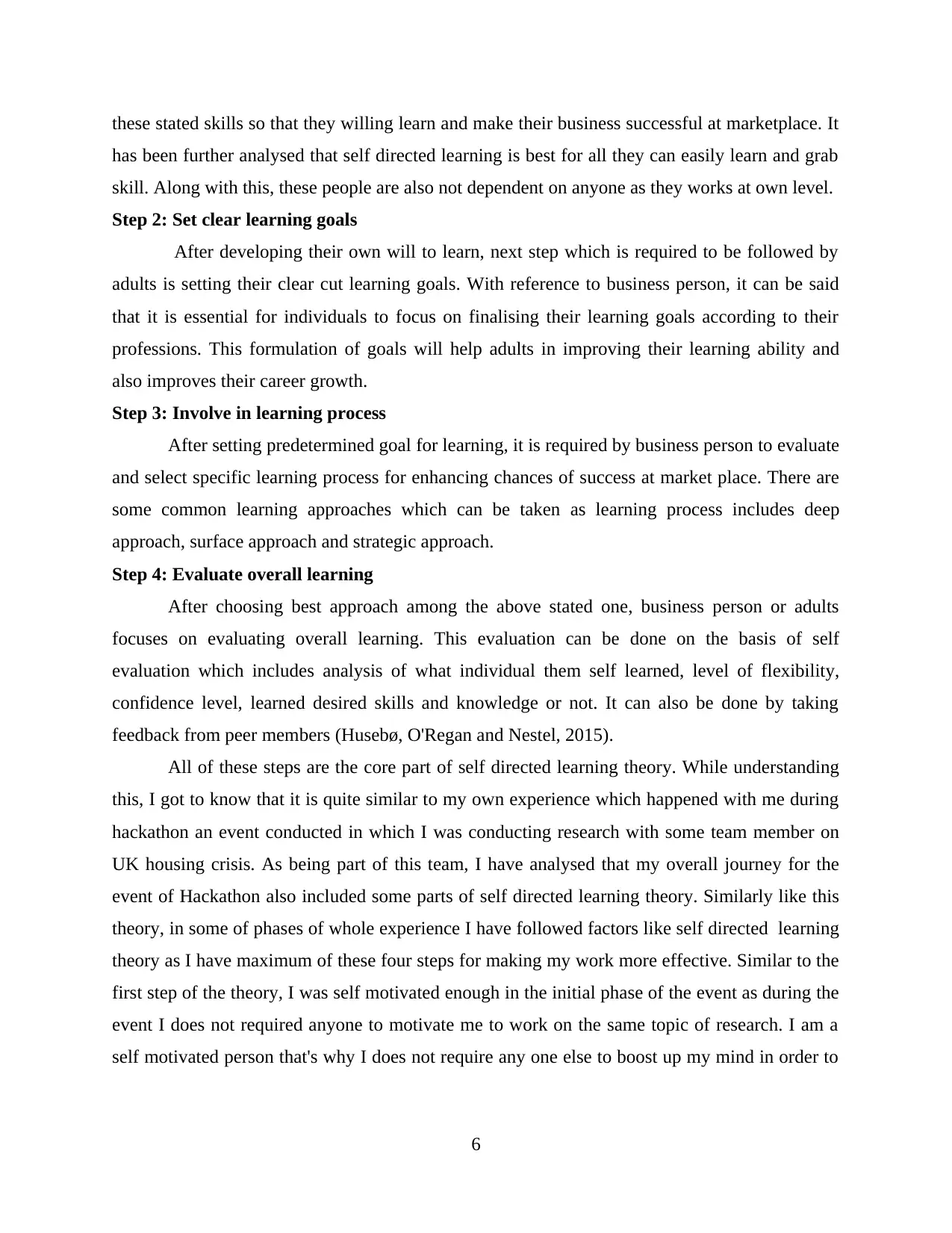
these stated skills so that they willing learn and make their business successful at marketplace. It
has been further analysed that self directed learning is best for all they can easily learn and grab
skill. Along with this, these people are also not dependent on anyone as they works at own level.
Step 2: Set clear learning goals
After developing their own will to learn, next step which is required to be followed by
adults is setting their clear cut learning goals. With reference to business person, it can be said
that it is essential for individuals to focus on finalising their learning goals according to their
professions. This formulation of goals will help adults in improving their learning ability and
also improves their career growth.
Step 3: Involve in learning process
After setting predetermined goal for learning, it is required by business person to evaluate
and select specific learning process for enhancing chances of success at market place. There are
some common learning approaches which can be taken as learning process includes deep
approach, surface approach and strategic approach.
Step 4: Evaluate overall learning
After choosing best approach among the above stated one, business person or adults
focuses on evaluating overall learning. This evaluation can be done on the basis of self
evaluation which includes analysis of what individual them self learned, level of flexibility,
confidence level, learned desired skills and knowledge or not. It can also be done by taking
feedback from peer members (Husebø, O'Regan and Nestel, 2015).
All of these steps are the core part of self directed learning theory. While understanding
this, I got to know that it is quite similar to my own experience which happened with me during
hackathon an event conducted in which I was conducting research with some team member on
UK housing crisis. As being part of this team, I have analysed that my overall journey for the
event of Hackathon also included some parts of self directed learning theory. Similarly like this
theory, in some of phases of whole experience I have followed factors like self directed learning
theory as I have maximum of these four steps for making my work more effective. Similar to the
first step of the theory, I was self motivated enough in the initial phase of the event as during the
event I does not required anyone to motivate me to work on the same topic of research. I am a
self motivated person that's why I does not require any one else to boost up my mind in order to
6
has been further analysed that self directed learning is best for all they can easily learn and grab
skill. Along with this, these people are also not dependent on anyone as they works at own level.
Step 2: Set clear learning goals
After developing their own will to learn, next step which is required to be followed by
adults is setting their clear cut learning goals. With reference to business person, it can be said
that it is essential for individuals to focus on finalising their learning goals according to their
professions. This formulation of goals will help adults in improving their learning ability and
also improves their career growth.
Step 3: Involve in learning process
After setting predetermined goal for learning, it is required by business person to evaluate
and select specific learning process for enhancing chances of success at market place. There are
some common learning approaches which can be taken as learning process includes deep
approach, surface approach and strategic approach.
Step 4: Evaluate overall learning
After choosing best approach among the above stated one, business person or adults
focuses on evaluating overall learning. This evaluation can be done on the basis of self
evaluation which includes analysis of what individual them self learned, level of flexibility,
confidence level, learned desired skills and knowledge or not. It can also be done by taking
feedback from peer members (Husebø, O'Regan and Nestel, 2015).
All of these steps are the core part of self directed learning theory. While understanding
this, I got to know that it is quite similar to my own experience which happened with me during
hackathon an event conducted in which I was conducting research with some team member on
UK housing crisis. As being part of this team, I have analysed that my overall journey for the
event of Hackathon also included some parts of self directed learning theory. Similarly like this
theory, in some of phases of whole experience I have followed factors like self directed learning
theory as I have maximum of these four steps for making my work more effective. Similar to the
first step of the theory, I was self motivated enough in the initial phase of the event as during the
event I does not required anyone to motivate me to work on the same topic of research. I am a
self motivated person that's why I does not require any one else to boost up my mind in order to
6
Paraphrase This Document
Need a fresh take? Get an instant paraphrase of this document with our AI Paraphraser
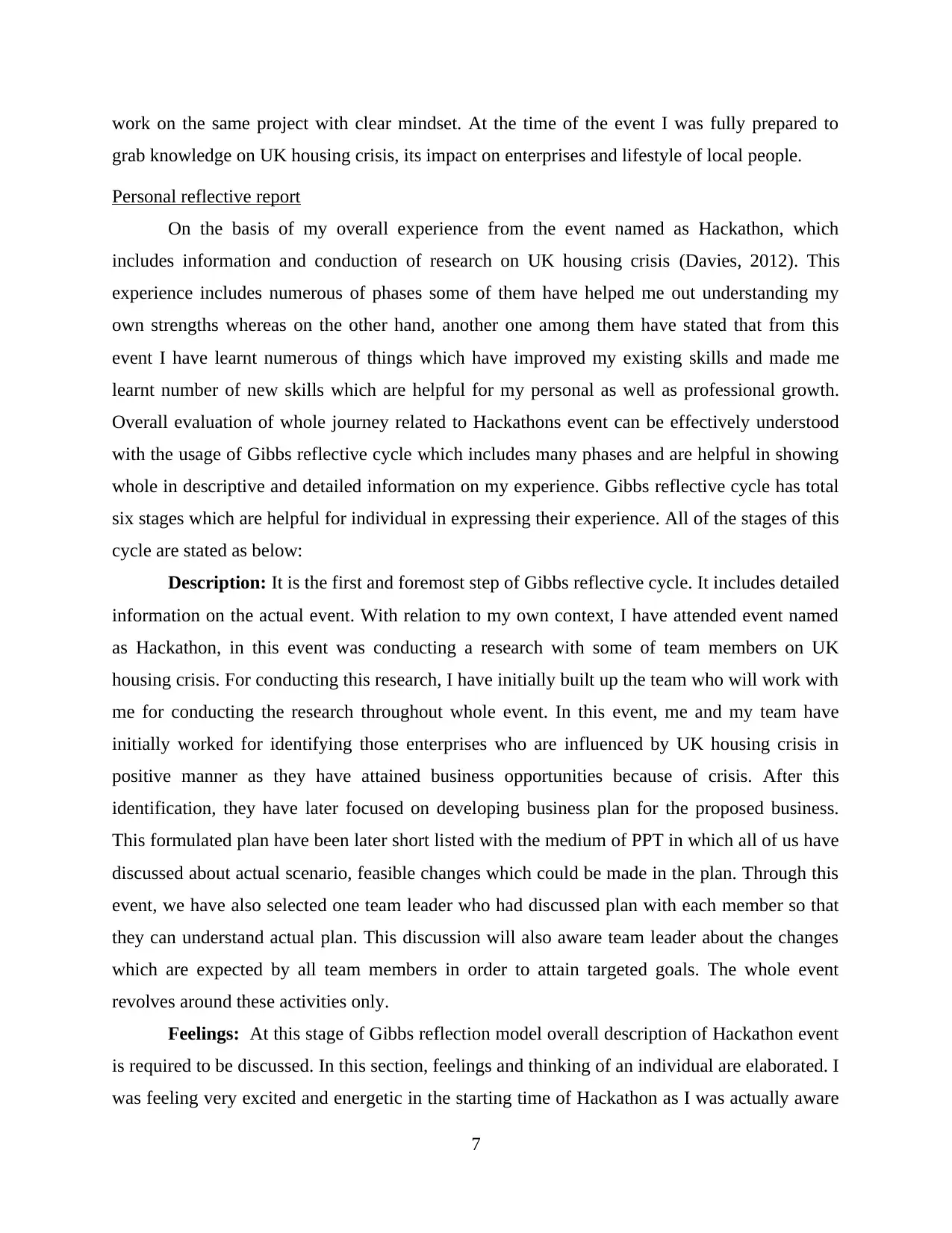
work on the same project with clear mindset. At the time of the event I was fully prepared to
grab knowledge on UK housing crisis, its impact on enterprises and lifestyle of local people.
Personal reflective report
On the basis of my overall experience from the event named as Hackathon, which
includes information and conduction of research on UK housing crisis (Davies, 2012). This
experience includes numerous of phases some of them have helped me out understanding my
own strengths whereas on the other hand, another one among them have stated that from this
event I have learnt numerous of things which have improved my existing skills and made me
learnt number of new skills which are helpful for my personal as well as professional growth.
Overall evaluation of whole journey related to Hackathons event can be effectively understood
with the usage of Gibbs reflective cycle which includes many phases and are helpful in showing
whole in descriptive and detailed information on my experience. Gibbs reflective cycle has total
six stages which are helpful for individual in expressing their experience. All of the stages of this
cycle are stated as below:
Description: It is the first and foremost step of Gibbs reflective cycle. It includes detailed
information on the actual event. With relation to my own context, I have attended event named
as Hackathon, in this event was conducting a research with some of team members on UK
housing crisis. For conducting this research, I have initially built up the team who will work with
me for conducting the research throughout whole event. In this event, me and my team have
initially worked for identifying those enterprises who are influenced by UK housing crisis in
positive manner as they have attained business opportunities because of crisis. After this
identification, they have later focused on developing business plan for the proposed business.
This formulated plan have been later short listed with the medium of PPT in which all of us have
discussed about actual scenario, feasible changes which could be made in the plan. Through this
event, we have also selected one team leader who had discussed plan with each member so that
they can understand actual plan. This discussion will also aware team leader about the changes
which are expected by all team members in order to attain targeted goals. The whole event
revolves around these activities only.
Feelings: At this stage of Gibbs reflection model overall description of Hackathon event
is required to be discussed. In this section, feelings and thinking of an individual are elaborated. I
was feeling very excited and energetic in the starting time of Hackathon as I was actually aware
7
grab knowledge on UK housing crisis, its impact on enterprises and lifestyle of local people.
Personal reflective report
On the basis of my overall experience from the event named as Hackathon, which
includes information and conduction of research on UK housing crisis (Davies, 2012). This
experience includes numerous of phases some of them have helped me out understanding my
own strengths whereas on the other hand, another one among them have stated that from this
event I have learnt numerous of things which have improved my existing skills and made me
learnt number of new skills which are helpful for my personal as well as professional growth.
Overall evaluation of whole journey related to Hackathons event can be effectively understood
with the usage of Gibbs reflective cycle which includes many phases and are helpful in showing
whole in descriptive and detailed information on my experience. Gibbs reflective cycle has total
six stages which are helpful for individual in expressing their experience. All of the stages of this
cycle are stated as below:
Description: It is the first and foremost step of Gibbs reflective cycle. It includes detailed
information on the actual event. With relation to my own context, I have attended event named
as Hackathon, in this event was conducting a research with some of team members on UK
housing crisis. For conducting this research, I have initially built up the team who will work with
me for conducting the research throughout whole event. In this event, me and my team have
initially worked for identifying those enterprises who are influenced by UK housing crisis in
positive manner as they have attained business opportunities because of crisis. After this
identification, they have later focused on developing business plan for the proposed business.
This formulated plan have been later short listed with the medium of PPT in which all of us have
discussed about actual scenario, feasible changes which could be made in the plan. Through this
event, we have also selected one team leader who had discussed plan with each member so that
they can understand actual plan. This discussion will also aware team leader about the changes
which are expected by all team members in order to attain targeted goals. The whole event
revolves around these activities only.
Feelings: At this stage of Gibbs reflection model overall description of Hackathon event
is required to be discussed. In this section, feelings and thinking of an individual are elaborated. I
was feeling very excited and energetic in the starting time of Hackathon as I was actually aware
7
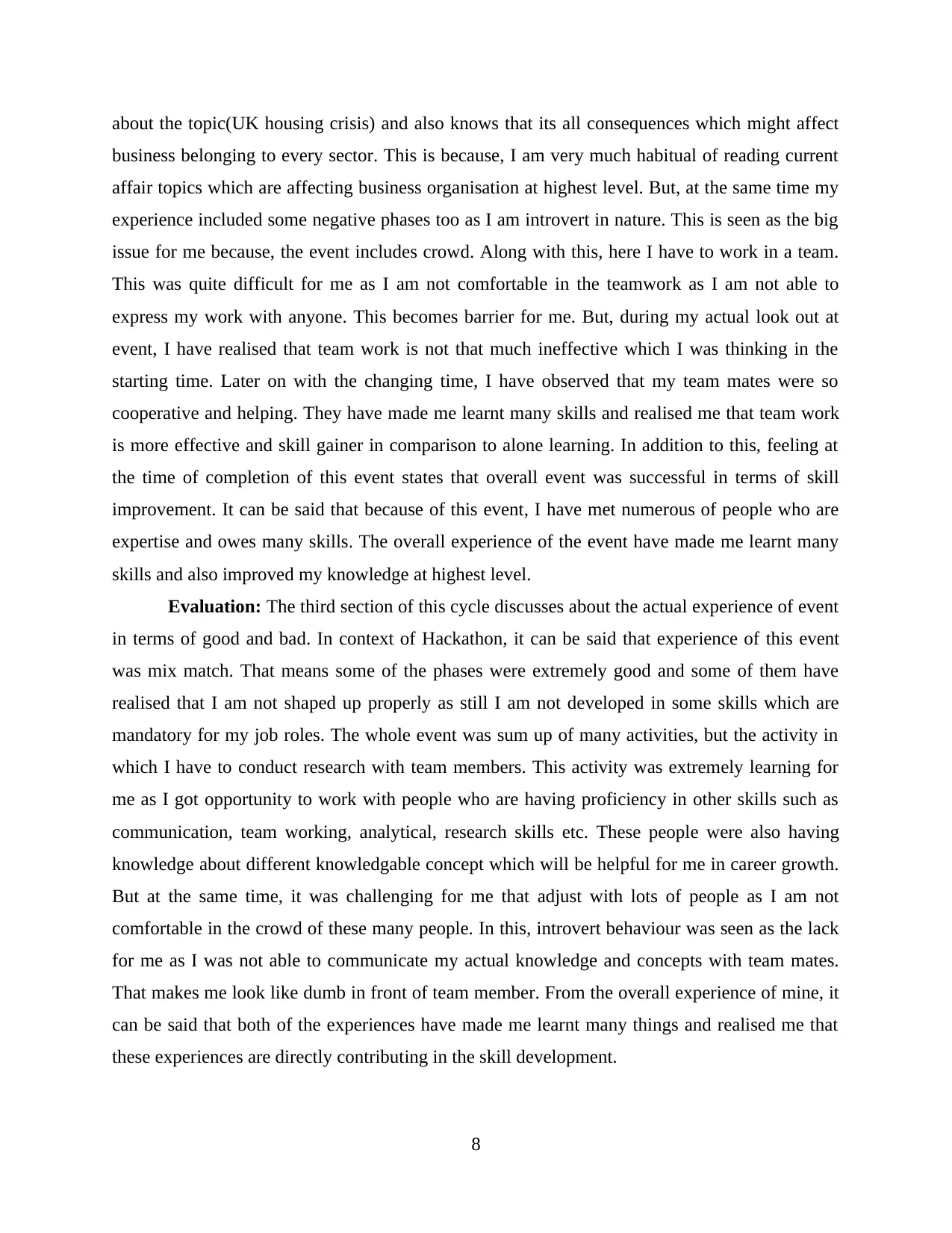
about the topic(UK housing crisis) and also knows that its all consequences which might affect
business belonging to every sector. This is because, I am very much habitual of reading current
affair topics which are affecting business organisation at highest level. But, at the same time my
experience included some negative phases too as I am introvert in nature. This is seen as the big
issue for me because, the event includes crowd. Along with this, here I have to work in a team.
This was quite difficult for me as I am not comfortable in the teamwork as I am not able to
express my work with anyone. This becomes barrier for me. But, during my actual look out at
event, I have realised that team work is not that much ineffective which I was thinking in the
starting time. Later on with the changing time, I have observed that my team mates were so
cooperative and helping. They have made me learnt many skills and realised me that team work
is more effective and skill gainer in comparison to alone learning. In addition to this, feeling at
the time of completion of this event states that overall event was successful in terms of skill
improvement. It can be said that because of this event, I have met numerous of people who are
expertise and owes many skills. The overall experience of the event have made me learnt many
skills and also improved my knowledge at highest level.
Evaluation: The third section of this cycle discusses about the actual experience of event
in terms of good and bad. In context of Hackathon, it can be said that experience of this event
was mix match. That means some of the phases were extremely good and some of them have
realised that I am not shaped up properly as still I am not developed in some skills which are
mandatory for my job roles. The whole event was sum up of many activities, but the activity in
which I have to conduct research with team members. This activity was extremely learning for
me as I got opportunity to work with people who are having proficiency in other skills such as
communication, team working, analytical, research skills etc. These people were also having
knowledge about different knowledgable concept which will be helpful for me in career growth.
But at the same time, it was challenging for me that adjust with lots of people as I am not
comfortable in the crowd of these many people. In this, introvert behaviour was seen as the lack
for me as I was not able to communicate my actual knowledge and concepts with team mates.
That makes me look like dumb in front of team member. From the overall experience of mine, it
can be said that both of the experiences have made me learnt many things and realised me that
these experiences are directly contributing in the skill development.
8
business belonging to every sector. This is because, I am very much habitual of reading current
affair topics which are affecting business organisation at highest level. But, at the same time my
experience included some negative phases too as I am introvert in nature. This is seen as the big
issue for me because, the event includes crowd. Along with this, here I have to work in a team.
This was quite difficult for me as I am not comfortable in the teamwork as I am not able to
express my work with anyone. This becomes barrier for me. But, during my actual look out at
event, I have realised that team work is not that much ineffective which I was thinking in the
starting time. Later on with the changing time, I have observed that my team mates were so
cooperative and helping. They have made me learnt many skills and realised me that team work
is more effective and skill gainer in comparison to alone learning. In addition to this, feeling at
the time of completion of this event states that overall event was successful in terms of skill
improvement. It can be said that because of this event, I have met numerous of people who are
expertise and owes many skills. The overall experience of the event have made me learnt many
skills and also improved my knowledge at highest level.
Evaluation: The third section of this cycle discusses about the actual experience of event
in terms of good and bad. In context of Hackathon, it can be said that experience of this event
was mix match. That means some of the phases were extremely good and some of them have
realised that I am not shaped up properly as still I am not developed in some skills which are
mandatory for my job roles. The whole event was sum up of many activities, but the activity in
which I have to conduct research with team members. This activity was extremely learning for
me as I got opportunity to work with people who are having proficiency in other skills such as
communication, team working, analytical, research skills etc. These people were also having
knowledge about different knowledgable concept which will be helpful for me in career growth.
But at the same time, it was challenging for me that adjust with lots of people as I am not
comfortable in the crowd of these many people. In this, introvert behaviour was seen as the lack
for me as I was not able to communicate my actual knowledge and concepts with team mates.
That makes me look like dumb in front of team member. From the overall experience of mine, it
can be said that both of the experiences have made me learnt many things and realised me that
these experiences are directly contributing in the skill development.
8
⊘ This is a preview!⊘
Do you want full access?
Subscribe today to unlock all pages.

Trusted by 1+ million students worldwide
1 out of 18
Related Documents
Your All-in-One AI-Powered Toolkit for Academic Success.
+13062052269
info@desklib.com
Available 24*7 on WhatsApp / Email
![[object Object]](/_next/static/media/star-bottom.7253800d.svg)
Unlock your academic potential
Copyright © 2020–2026 A2Z Services. All Rights Reserved. Developed and managed by ZUCOL.




